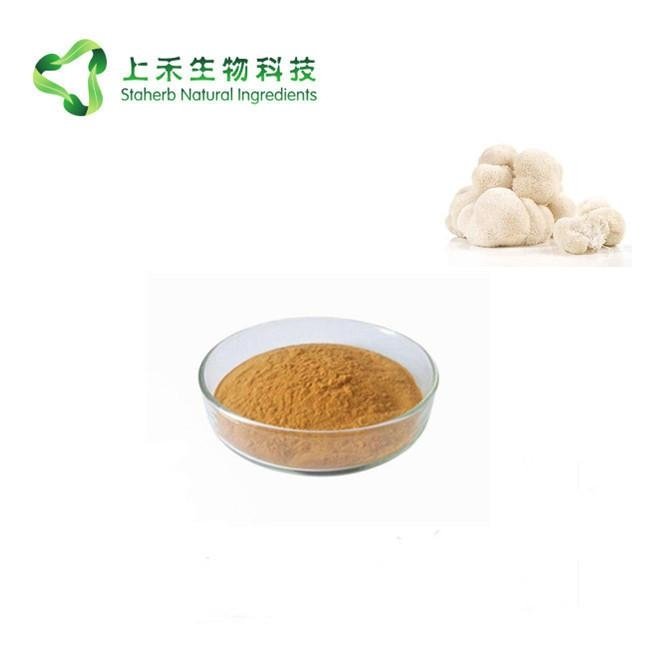lion's mane mushroom extract
Prodcut name: Hericium Erinaceus Extract /Lion’s Mane Mushroom
Characteristic: Soluable to Water,moisture absorb easily
Specification: 30% 50% Polysaccharides
Test Mathod: UV / HPLC
Hericium erinaceus is China's traditional precious edible fungus. Hericium is not only delicious, but very
nutritious.The effective pharmacological components of Hericium erinaceus are not yet completely known,and the
active components are Hericum erinaceus polysaccharide, Hericium erinaceus oleanolic acid, and Hericium
erinaceus trichostatin A, B, C, D, F.Most of Hericium erinaceus in clinical application are extracted and made from
fruit bodies.Modern medical research found that Hericium erinaceus has quite high medicinal value,and
experiments show that cancer patients take Hericium erinaceus products can enhance immunity, reduce masses and
extend survival period after surgery or chemotherapy
The Structure of a Mushroom
Before we get into specifics, it's good to understand the basic structure of a mushroom, which is comprised of the fruiting body and mycelium. The life and reproduction cycle of a typical mushroom can be seen in the diagram above.
Mushroom Fruiting Body
The fruiting body of a mushroom is the part that grows above ground, and it is how you typically identify a mushroom. The fruiting body contains the spores for reproduction, but it is also the most nutrient-rich part of a mushroom. The fruiting bodies and chitin within their cell walls contain a host of various vitamins and minerals, including B and C vitamins, zinc, copper, selenium, and other important nutrients.
Mycelium
The mycelium usually grows underground and can be considered the roots of the mushroom. The mycelium provides nutrients to the rest of the mushroom, feeding the whole mushroom by processing and breaking down dead matter.
Mycelium based "mushroom" powders are inferior to whole fruiting bodies extracts because of the substrates they are grown on, and how they are processed. We explain this in the next section.
Function of Lions Mane Extract
1.Lions Mane Extract can nourish organs, and can cure chronic gastricism, duodenum ulcer and other enteron diseases.
2.Lions Mane Extract can also improve people's immune system.
3.Lions Mane Extract contains unsaturated fatty acids which is propitious to the circulation of blood and can reduce blood cholesterin content, so 4.Lions Mane Extract is also the ideal food for those who are high blood pressure or with heart or blood vessel disease
Application of Lions Mane Extract
1.Lions Mane Extract is applied in pharmaceutical industry to produce capsules and pills.
2.Lions Mane Extract is added into functional food to enhance its nutrition.
3.Lions Mane Extract is added into water-soluble beverages.
For more product information pls contact email sales09@staherb.cn
|
Analysis Item
|
Specification
|
Result
|
|
Assay (Polysaccharides)
|
≥50.0%
|
52.35%
|
|
Color
|
Yellow-Brown Fine Powder
|
Complies
|
|
Taste
|
Characteristic
|
Complies
|
|
Odor
|
Characteristic
|
Complies
|
|
Mesh Size
|
80mesh
|
98% pass 80 mesh
|
|
Part used
|
Fruit Body
|
Complies
|
|
Loss On Drying
|
≤7.0%
|
3.18%
|
|
Ash
|
≤9.0%
|
4.06%
|
|
Total Heavy Metals
|
≤10ppm
|
Complies
|
|
As
|
≤1ppm
|
Complies
|
|
Pb
|
≤2ppm
|
Complies
|
|
Cd
|
≤1ppm
|
Complies
|
|
Hg
|
≤0.2ppm
|
Complies
|
|
Pesticides Residues
|
≤1ppm
|
Not Detected
|
|
Total Plant Count
|
≤10,000cfu/g
|
Complies
|
|
Yeast & Mould
|
≤100cfu/g
|
Complies
|
|
Salmonella
|
Negative
|
Negative
|
|
E.Coli
|
Negative
|
Negative
|
|
Staphylococcus
|
Negative
|
Negative
|
References:
- 1.
Crowder RJ, Freeman RS. Phosphatidylinositol 3-kinase and Akt protein kinase are necessary and sufficient for the survival of nerve growth factor-dependent sympathetic neurons. J Neurosci 1998;18:2933–2943.
- 2.
Kaplan DR, Miller FD. Signal transduction by the neurotrophin receptors. Curr Opin Cell Biol 1997;9:213–221.
- 3.
Broude E, McAtee M, Kelley MS, Bregman BS. c-Jun expression in adult rat dorsal root ganglion neurons: differential response after central or peripheral axotomy. Exp Neurol 1997;148:367–377.
- 4.
Tsai YC, So EC, Chen HH, Wang LK, Chien CH. Effect of intrathecal octreotide on thermal hyperalgesia and evoked spinal c-Fos expression in rats with sciatic constriction injury. Pain 2002;99:407–413.
- 5.
Verma P, Chierzi S, Codd AM, Campbell DS, Meyer RL, Holt CE, et al. Axonal protein synthesis and degradation are necessary for efficient growth cone regeneration. J Neurosci 2005;25:331–342.
- 6.
Willis D, Li KW, Zheng JQ, Smit AB, Kelly TK, Merianda TT, et al. Differential transport and local translation of cytoskeletal, injury-response, and neurodegeneration protein mRNAs in axons. J Neurosci 2005;25:778–791.
- 7.
Miles PG, Chang ST. Mushroom biology: concise basics and current developments. Singapore: World Scientific Press; 1997:1–9.
- 8.
Kawagishi H, Zhuang C, Yunoki R. Compounds for dementia from Hericium erinaceum. Drugs Future 2008;33:149–155.
- 9.
Moldavan MG, Grygansky A, Kolotushkina OV, Kirchhoff B, Skibo GG, Pedarzani P. Neurotropic and trophic action of lion’s mane mushroom Hericium erinaceus (Bull.: Fr) Pers. (Aphyllophoromycetideae) extracts on nerve cells in vitro. Int J Med Mush 2007;9:15–28.
- 10.
Kolotushkina EV, Moldavan MG, Voronin KY, Skibo GG. The influence of Hericium erinaceus extract on myelination process in vitro. Fiziologicheskii Zhur 2003;49:38–45.
- 11.
Wong KH, Sabaratnam V, Abdullah N, Naidu M, Keynes R. Activity of aqueous extracts of lion’s mane mushroom Hericium erinaceus (Bull.: Fr.) Pers. (Aphyllophoromycetideae) on the neural cell line NG108-115. Int J Med Mushr 2007;9:57–65.
- 12.
Wong KH, Naidu M, David P, Abdulla MA, Abdullah N, Kuppusamy UR, et al. Peripheral nerve regeneration following crush injury to rat peroneal nerve by aqueous extract of medicinal mushroom Hericium erinaceus (Bull.: Fr) Pers. (Aphyllophoromycetideae). Evid Based Complment Altern Med 2011;doi: 10.1093/ecam/neq062
- 13.
Association of Official Analytical Chemists (AOAC). Official methods of analysis of the Association of Official Analytical Chemists. 15th ed. USA: Washington, DC; 1990:751.
- 14.
American Association of Cereal Chemists (AACC International). Approved methods of analysis-method 08-01.01, 30-10.01, 46-12.01 and 32-10.01. 16th ed. USA: St. Paul, MN; 1995.
- 15.
Roy SK, Maiti D, Mondal S, Das D, Islam SS. Structural analysis of a polysaccharide isolated from the aqueous extract of an edible mushroom, Pleurotus sajor-caju, cultivar Black Japan. Carbohydrate Res 2008;343:1108–1113.
- 16.
Kozarski M, Klaus A, Niksi M, Jakovljevic D, Helsper JPFG, van Griensven LJLD. Antioxidative and immunomodulating activities of polysaccharide extracts of the medicinal mushrooms Agaricus bisporus, Agaricus brasiliensis, Ganoderma lucidum and Phellinus linteus. Food Chem 2011:129:1667–1675.
- 17.
Chen B, Song Y, Liu Z. Promotion of nerve regeneration in peripheral nerve by short-course FK506 after end-to-side neurorrhaphy. J Surg Res 2009;152:303–310.
- 18.
Algora J, Chen LE, Seaber AV, Wong GH, Urbaniak JR. Functional effects of lymphotoxin on crushed peripheral nerve. Microsurgery 1996;17:131–135.
- 19.
Wong KH, Sabaratnam V, Abdullah N, Kuppusamy UR, Naidu M. Effects of cultivation techniques and processing on antimicrobial and antioxidant activities of Hericium erinaceus (Bull.: Fr.) Pers. extracts. Food Tech Biotechnol 2009;47:47–55.
- 20.
Kim JH, Ha HC, Lee MS, Kang JI, Kim HS, Lee SY, et al. Effect of Tremella fuciformis on the neurite outgrowth of PC12h cells and the improvement of memory in rats. Biol Pharm Bull 2007;30:708–714.
- 21.
Gorio A, Lesma E, Vergani L, Di Giulio AM. Glycosaminoglycan supplementation promotes nerve regeneration and muscle reinnervation. Eur J Neurosci 1997;9:1748–1753.
- 22.
Rop O, Mlcek J, Jurikova T. Beta-glucans in higher fungi and their health effects. Nutr Rev 2009;67:624–631.
- 23.
Edagawa Y, Smriga M, Nishiyama N, Saito H. Systemic administration of lentinan, a branched beta-glucan, enhances long-term potentiation in the rat dentate gyrus in vivo. Neurosci Lett 2001; 314:139–142.
- 24.
Tsukagoshi S, Hashimoto Y, Fujii G, Kobayashi H, Nomoto K, Orita K. Krestin (PSK). Cancer Treat Rev 1984;11:131–155.
- 25.
Choong YK, Abdul Rashid BA, Young SI, Young SI, Ismail Z. Quantification and identification of polysaccharide contents in Hericium erinaceus. Nutr Food Sci 2007;37:260–271.
- 26.
Wen YR, Suter MR, Ji RR, Yeh GC, Wu YS, Wang KC, et al. Activation of p38 mitogen-activated protein kinase in spinal microglia contributes to incision-induced mechanical allodynia. Anesthesiology 2009;1:155–165.
- 27.
Naidu M, David RP, Asher R, Fawcett J. Expression of Akt and MAPK in the normal and regenerating peripheral nerves and their dorsal root ganglia. Malaysian J Biochem Mol Biol 2009;17:16–19.
- 28.
Ito Y, Sakagami H, Kondo H. Enhanced gene expression for phosphatidylinositol 3-kinase in the hypoglossal motoneurons following axonal crush. Mol Brain Res 1996;37:329–332.
- 29.
Sweatt JD. The neuronal MAP kinase cascade: a biochemical signal integration system subserving synaptic plasticity and memory. J Neurochem 2001;76:1–10.
- 30.
Namikawa K, Honma M, Abe K, Takeda M, Mansur K, Obata T, et al. Akt/protein kinase B prevents injury-induced motoneuron death and accelerates axonal regeneration. J Neurosci 2002;20:2875–2886.
- 31.
Raivich G, Behrens A. Role of the AP-1 transcription factor c-Jun in developing, adult and injured brain. Prog Neurobiol 2006;78:347–363.
- 32.
Kajander KC, Madsen AM, Iadarola MJ, Draisci G, Wakisaka S. Fos-like immunoreactivity increases in the lumbar spinal cord following a chronic constriction injury to the sciatic nerve of rat. Neurosci Lett 1996;206:9–12.
- 33.
Kenney AM, Kocsis JD. Timing of c-Jun protein induction in lumbar dorsal root ganglia after sciatic nerve transection varies with lesion distance. Brain Res 1997;751:90–95.
- 34.
Leah JD, Herdegen T, Bravo R. Selective expression of Jun proteins following axotomy and axonal transport block in peripheral nerves in the rat: evidence for a role in the regeneration process. Brain Res 1991;566:198–207.
- 35.
Chi SI, Levine JD, Basbaum AI. Peripheral and central contributions to the persistent expression of spinal cord foslike immunoreactivity produced by sciatic nerve transection in the rat. Brain Res 1993;617:225–237.
- 36.
Zheng JQ, Kelly TK, Chang B, Ryanzantsev S, Rajasekaran AK, Martin KC, et al. A functional role for intra-axonal protein synthesis during axonal regeneration from adult sensory neurons. J Neurosci 2001;21:9291–9303.
- 37.
Willis DE, Twiss JL. The evolving roles of axonally synthesized proteins in regeneration. Curr Opin Neurobiol 2006;16:111–118.
- 38.
Bamburg JR, McGough A, Ono S. Putting a new twist on actin: ADF/cofilins modulate actin dynamics. Trends Cell Biol 1999;9:364–370.
- 39.
Giuditta A, Kaplan BB, van Minnen J, Alvarez J, Koenig E. Axonal and presynaptic protein synthesis: new insights into the biology of the neuron. Trends Neurosci 2002;25(8):400–404.
-
Changsha Staherb Natural Ingredients Co.,ltd.
Address: Room.202, Buliding B8, Huanchuang Enterprise Square, High-tech Development Zone, Changsha, Hunan, China(410205)
Contact:Mary
Email: sales05@staherb.cn sales@staherb.cn
Tel :+86-(0)731-84213302 Fax:+86-(0)731-85953715
Website:www.staherb.cn
|
|



